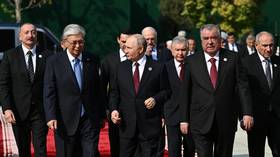Russian-Indian joint venture unveils design for new high-speed train

A Russian‑Indian joint venture has showcased the first design of a new high‑speed sleeper coach at the International Railway Equipment Exhibition in New Delhi.
Kinet is a joint venture between Russian rolling stock companies and Indian government-owned Rail Vikas Nigam Limited (RVNL) for the manufacturing and maintenance of 120 Indian ‘Vande Bharat’ high-speed trains.
The venture is expected to unveil the first prototype in June 2026, with manufacturing set to begin by the end of December, marking a major milestone in India’s high-speed rail development, Nishunk Garg, project director at Kinet Railway Solutions, was quoted as telling news channel Public TV.
🇮🇳🤝🇷🇺A New Rail Chapter: Kinet Unveils Vande Bharat Sleeper Coach Concept at IREE 2025Kinet - a Russian‑Indian joint venture – presented a full‑scale mock‑up of a Vande Bharat high‑speed sleeper coach at the International Railway Equipment Exhibition - with modern amenities &… pic.twitter.com/AYp763LUOh
— RT_India (@RT_India_news) October 15, 2025
Garg added that the company has already completed the car body of the first sleeper coach at its manufacturing facility in Latur, located in the state of Maharashtra. Kinet won the tender after offering the lowest price of 1.2 billion rupees ($14.61 million) per train, seeing off rivals such as German giant Siemens, France’s Alstom Transport, and Switzerland’s Stadler Rail.
The company’s target is to roll out the first Vande Bharat sleeper coach train by next year, he said, adding that one coach, the car body, has already been constructed at its factory in Latur for demonstration.
The trains produced through the joint venture will be utilized for Indian Railways' Vande Bharat program, an initiative launched in 2019 aimed at modernizing long-distance travel routes and enhancing transportation efficiency.
Speaking at the exhibition, Indian Railway Minister Ashwini Vaishnaw said New Delhi is working on the next generation of high-speed trains, with a strong focus on the export market, according to a report by the Indian Express.
“India is currently operating Vande Bharat 3.0, which represents a significant improvement over its earlier versions,” he was quoted as saying. The minister added that there are plans to construct 7,000km of dedicated passenger corridors by 2047. By the same timeframe, Indian Railways plans to procure 4,500 new Vande Bharat trains.













